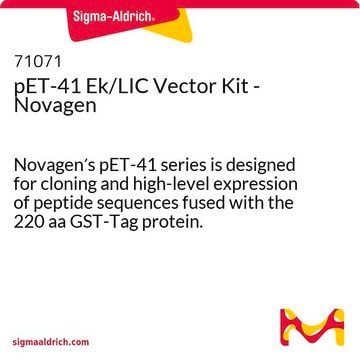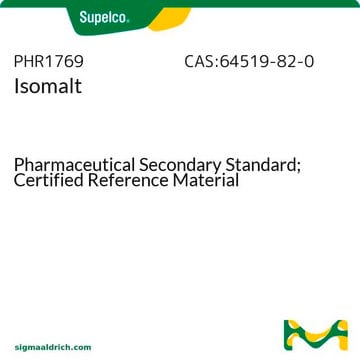85529
D-Sorbitol
BioUltra, ≥99.0% (HPLC)
Sinónimos:
D-Glucitol
About This Item
Productos recomendados
vapor density
<1 (vs air)
Quality Level
vapor pressure
<0.1 mmHg ( 25 °C)
product line
BioUltra
assay
≥99.0% (HPLC)
form
powder
optical activity
[α]20/D −1.5±0.3°, c = 10% in H2O
impurities
insoluble matter, passes filter test
ign. residue
≤0.1% (as SO4)
loss
≤0.5% loss on drying, 20 °C (HV)
color
colorless
pH
5.0-7.0 (25 °C, 1 M in H2O)
mp
98-100 °C (lit.)
solubility
H2O: 1 M at 20 °C, clear, colorless
anion traces
chloride (Cl-): ≤50 mg/kg
sulfate (SO42-): ≤50 mg/kg
cation traces
Al: ≤5 mg/kg
As: ≤0.1 mg/kg
Ba: ≤5 mg/kg
Bi: ≤5 mg/kg
Ca: ≤10 mg/kg
Cd: ≤5 mg/kg
Co: ≤5 mg/kg
Cr: ≤5 mg/kg
Cu: ≤5 mg/kg
Fe: ≤5 mg/kg
K: ≤50 mg/kg
Li: ≤5 mg/kg
Mg: ≤5 mg/kg
Mn: ≤5 mg/kg
Mo: ≤5 mg/kg
Na: ≤50 mg/kg
Ni: ≤5 mg/kg
Pb: ≤5 mg/kg
Sr: ≤5 mg/kg
Zn: ≤5 mg/kg
SMILES string
OC[C@@H](O)[C@@H](O)[C@H](O)[C@@H](O)CO
InChI
1S/C6H14O6/c7-1-3(9)5(11)6(12)4(10)2-8/h3-12H,1-2H2/t3-,4+,5-,6-/m1/s1
InChI key
FBPFZTCFMRRESA-JGWLITMVSA-N
¿Está buscando productos similares? Visita Guía de comparación de productos
Application
Biochem/physiol Actions
Other Notes
Storage Class
11 - Combustible Solids
wgk_germany
WGK 1
flash_point_f
Not applicable
flash_point_c
Not applicable
ppe
Eyeshields, Gloves, type N95 (US)
Certificados de análisis (COA)
Busque Certificados de análisis (COA) introduciendo el número de lote del producto. Los números de lote se encuentran en la etiqueta del producto después de las palabras «Lot» o «Batch»
¿Ya tiene este producto?
Encuentre la documentación para los productos que ha comprado recientemente en la Biblioteca de documentos.
Los clientes también vieron
Nuestro equipo de científicos tiene experiencia en todas las áreas de investigación: Ciencias de la vida, Ciencia de los materiales, Síntesis química, Cromatografía, Analítica y muchas otras.
Póngase en contacto con el Servicio técnico







